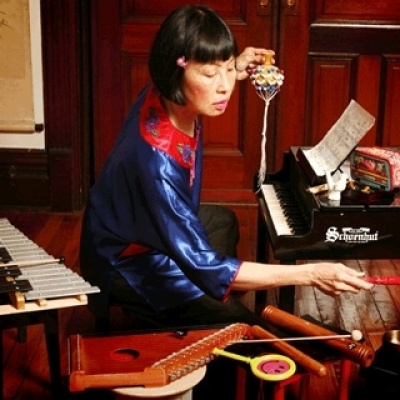
Margaret Leng Tan
华裔钢琴奇女子陈灵来自新加坡,是第一位美国朱丽亚音乐学院女性钢琴演奏博士,也是全球第一位玩具钢琴家。她演奏时拳头、手掌、前臂并用,有时甚至用手伸入琴内直接拨钢琴琴弦,像弹古筝或琵琶一样。许多着名作曲家如欧美的菲利普葛拉斯、中国的谭盾、葛甘孺以及日本的佐藤聪明都特别爲她作曲。陈灵对音乐创作、大钢琴、玩具钢琴及狗儿的热诚,将会令观众热血沸腾,如 Time Out 所说:「即时的、震天骇地,比在体育馆玩摇滚乐更厉害」。 by Uncle Dave Lewis Margaret Leng Tan has established herself as a major force within the American avant-garde -- a highly visible, talented, and visionary pianist whose work sidesteps perceived artificial boundaries within the usual concert experience and creates a new level of communication with listeners. Embracing aspects of theater, choreography, performance, and even "props" such as the teapot she "plays" in Alvin Lucier's Nothing Is Real, Tan has brought to the avant-garde a measure of good old-fashioned showmanship that is tempered with a disciplinary rigor inherited from her mentor, composer John Cage. This has won Tan acceptance far beyond the norm for performers of avant-garde music, as she is regularly featured at international festivals, records often for labels such as Mode and New Albion, and has appeared on American public television, Lincoln Center, and even at Carnegie Hall. Born in Singapore, Tan was the first woman to earn a doctorate from Juilliard, but youthful restlessness and a desire to explore the crosscurrents between Asian music and that of the West led her to Cage. This sparked an active collaboration between Cage and Tan that lasted from 1981 to his death, during which time Tan gained recognition as one of the preeminent interpreters of Cage's piano music, partly through her New Albion recordings Daughters of the Lonesome Isle and The Perilous Night/Four Walls. After Cage's death in 1992, she was chosen as the featured performer in a tribute to his memory at the 45th Venice Biennale. Tan takes a lively interest the musical potential of unconventional and unlikely instruments, and her groundbreaking CD in 1997 issued as The Art of the Toy Piano on Point Music/Universal Classics elevated the lowly toy piano to the status of a "real" instrument. Tan is certainly the world's first, and so far only, professional toy piano virtuoso. Since then, her curiosity has extended to other toy instruments as well, substantiating her credo, "Poor tools require better skills," as Marcel Duchamp once put it. Tan favors music that confronts and defies the established boundaries of the piano and her toy instruments, and has collaborated with like-minded composers to create works for her, such as Somei Satoh, Tan Dun, Michael Nyman, Julia Wolfe, Toby Twining, and Ge Gan-Ru; she is also a favorite of composer George Crumb. Tan's authority on matters of Cage has evolved from that of an expert interpreter to responsible scholar protecting the textual integrity of his work; Tan edited the fourth volume of Cage's piano music for C. F. Peters and in 2006 gave the premiere of his newly discovered 1944 work Chess Pieces, which she also edited for publication. Tan's Mode DVD of Cage's Sonatas and Interludes includes a video in which she examines the original, 1940s-era preparation materials for the work. Photogenic and comfortable with the camera, Tan is the subject of a documentary by filmmaker Evans Chan, Sorceress of the New Piano: The Artistry of Margaret Leng Tan, which aired on the Discovery Channel in 2004 and will be available as a DVD on Mode Records in 2007.
